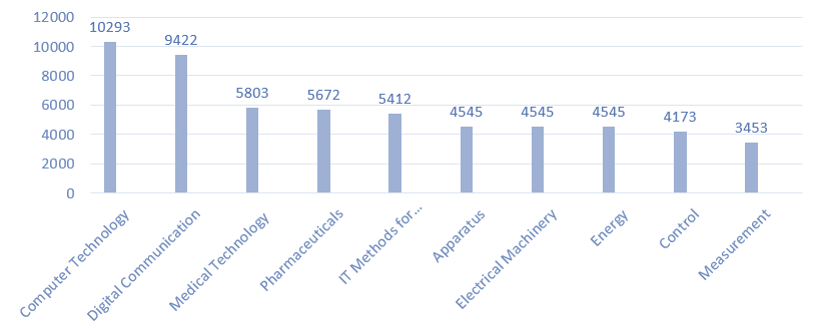India’s IP Ecosystem

India's intellectual property (IP) landscape is dynamic and ever-evolving, reflecting the rapid growth of the national economy. Following the 2016 announcement of the nation's first National Intellectual Property Rights (IPR) policy, the environment in the nation has improved to foster creativity and innovation. One of the most important prerequisites for a flourishing knowledge economy that encourages constant innovation is a strong legal framework. A significant portion also goes to emerging technology and shifting industry trends.
According to the World Intellectual Property Organization's 2023 Global Innovation Index rankings, India remained ranked 40th out of 132 economies. India has risen steadily over the last few years in the Global Innovation Index, moving up from the 81st position in 2015 to the 40th position in 2023. As the Prime Minister emphasizes Atma Nirbhar Bharat, innovation has been critical in overcoming the difficulties presented by the epidemic and is likely to play a key role in reinforcing the nation's resilience.
Finance Minister Nirmala Sitharaman disclosed a Rs 1 lakh crore fund intended to provide long-term, low-cost, or zero-interest loans for research and development during her 2024 interim budget speech. She also promised to launch a new project to improve deep-tech capabilities in the defense industry. Later in the year, an announcement that goes beyond defense is expected to be made to supplement this one. It will support deep tech firms in a variety of areas. The government's overall plan for the research and development sector is highlighted by the fund's interconnectedness with the defense deep tech effort. Advanced research in the fields of biotechnology, semiconductors, material sciences, quantum technologies, artificial intelligence, data sciences, robotics, 3D printing, and others will be highlighted.
India – WIPO Key Agreements – 2023
Signed a formal collaboration agreement with the Department of Biotechnology to support the participation of four Fellows who are sponsored by WIPO in the "Bio-design Program."
An agreement was reached to add India's collection of relevant court decisions to the WIPO Lex Judgments database.
A formal declaration of intent was released to establish a joint Master's program in Intellectual Property with the National Law University, New Delhi. To assist India's small and medium-sized businesses (SMEs), the Director General unveiled a customized version of WIPO's IP Diagnostics tool, which will be translated into each of the six official languages of the nation.
The Indian government has emphasized how women are becoming more and more prominent in leadership positions in a variety of industries, especially in startups, and how this might have a substantial impact on the country. Remarkably, one or more women directors are now featured in almost half of Indian businesses, demonstrating India's acknowledgement of women's accomplishments internationally.
The government's actions are paying off; according to the Annual Report on Initial Public Offerings,
India had an almost 25% increase in the number of patent applications filed, from 66,440 in 2021–2022 to 82,811 in 2022–2023.
Emerging Technology Patents
The Indian government has launched a number of programs to increase the nation's understanding of intellectual property, such as offering financial assistance for the filing of foreign patents, spreading awareness of IPR, and offering help desk services related to IPR. The percentage of emerging technology patents registered in India has been expanding rapidly; in 2022, it will account for 72.9% of all technology patents submitted, up from 48% in 2010.
India works to create an atmosphere that promotes technological and economic advancement through its laws pertaining to intellectual property (IP). The nation ratified the Trade Related Aspects of Intellectual Property Rights (TRIPS) agreement in 1994, which established the minimal requirements for IP rights among WTO participants.
The Patents Act of 1970, the Copyright Act of 1957, the Trade Marks Act of 1999, the Designs Act of 2000, the Semiconductor Integrated Circuits Layout-Design Act of 2000, and the Geographical Indication of Goods (Registration & Protection) Act of 1999 are only a few of the laws that govern intellectual property rights in the nation.
In India, these laws safeguard data protection, industrial designs, patents, trade secrets, trademarks, copyrights, and geographical indications. For trademark infringement or "passing off," legal action may be taken in both civil and criminal courts. Over time, there has been a significant shift in the economics and management of intellectual property rights.
Key Technological Areas
Key technological area is a specific sector within technology that is considered vital and has a significant impact on various industries, society, or scientific advancements. These fields often represent ongoing study, cutting-edge discoveries, and innovation. Key technical domains may change over time as new technologies emerge and societal demands shift. Digital communication is currently the second-fastest-growing technology field, after computers and related technologies. A quarter of all published patent applications in 2023 are related to computers or related technologies. In 2023, digital communication and computers accounted for 31% of all patents published.

Emerging Technological Areas
An emerging technological area is a field or sector of technology that is now in its early stages of development, receiving attention, and showing signs of significant advancements in the near future. A number of cutting-edge technology fields, including machine learning, wireless communication, electric vehicles, ICE, optical fiber, food products, energy storage, and nanoparticles, are receiving more attention in India. These industries are seeing a sharp increase in patent applications, and it is expected that they would have a big impact on India's creative and technological environment. The focus on these emerging technological disciplines is anticipated to drive India's growth within the global technology industry as it works to establish itself as a hub for innovation and technology.

Prominent Assignees Leading the Patent Filing Space
Prominent assignees are frequently large corporations, academic organizations, or tech behemoths that have a substantial impact on the advancement of technology in particular sectors. These firms are acknowledged for their contributions to technological developments and may possess substantial patent portfolios spanning multiple areas.
.png)
A Visionary 5-Year Growth Model
Positive trends are seen in India's 5-year Intellectual Property Rights (IPR) growth model. The number of awarded patents and IPR applications has increased during this time.
The industry's expansion has been greatly aided by the Indian government's initiatives, which include updating IP offices, hiring more people, and implementing IT for electronic filing.
The staff members of the IP Offices have continuously played a major role in these awareness campaigns.
Training of IPO Officers
For new Patents & Designs Examiners, the Office of CGPDTM organized training courses. For Controllers of Patents, it offered refresher/legal training. The goal was to strengthen the foundation of human resources, support capacity building in IP offices, and improve the knowledge and abilities of IP officials. These training sessions were given by RGNIIPM, Nagpur.
National Awareness Programs by the Office of CGPDTM
The Office of CGPDTM's National understanding Programs: Within a set timeline, CGPDTM was entrusted with raising one million students' understanding of intellectual property.
Other Initiatives by the Office of CGPDTM
Upgrading and digitizing the application submission procedure.
Enhancing the efficiency of patent examination and approval timelines.
Conducting campaigns and workshops to promote awareness.
Providing incentives for startups, MSMEs, and educational institutions.
Prioritizing the recruitment of examiners.
Expediting processes for educational institutions and startups through fast-tracking initiatives.
Results of the various initiatives
Numerous actions have had a net positive effect on India's intellectual property ecosystem. Impact is observed in the patent grant rate and design examination rate. In 2022–2023, the grant rate increased by 13.5% over the previous year; when compared to data from five years prior, the grant rate increased by over 100%. Additionally, the recently filed design registration examination's pendency was reduced to one month. (Reference: IPO Annual Report)

Challenges faced by the Indian Patent office
Indeterminacy in patent approval timelines and examiner responses.
Insufficient proficiency within the patent office.
Specific legal provisions causing delays in the entire process.
Overheads in the expenses associated with filing for patents.
Complexity in the patent filing procedure.
In academia, patents face a lack of acknowledgment compared to research publications.
Absence of clarity on the patentability of software.
Limited awareness about incentives and schemes among patent filers.
Judiciary’s response to the evolving IP ecosystem
The ability to defend and enforce one's intellectual property rights in the event that they are violated is essential to the value of intellectual property rights. As a result, the judiciary assumes a similar role in any nation's robust intellectual property ecosystem. The court has also taken major action recently to guarantee prompt case resolution, convenient complaint filing, and improved alternative conflict resolution procedures.
The ability to defend and enforce one's intellectual property rights in the event that they are violated is essential to the value of intellectual property rights. As a result, the judiciary assumes a similar role in any nation's robust intellectual property ecosystem. The court has also taken major action recently to guarantee prompt case resolution, convenient complaint filing, and improved alternative conflict resolution procedures.
The Intellectual Property Appellate Board was dissolved by the Tribunals Reforms (Rationalization and Conditions of Service) Ordinance, 2021. (IPAB). The Delhi High Court's Honorable Chief Justice formed a committee to thoroughly examine the situation in light of the Ordinance, and the Committee's recommendations led to the establishment of the Delhi High Court's Intellectual Property Division (IPD) in July 2021. Following the formation of the Delhi High Court's IP Division, the Madras High Court notified the Madras High Court Intellectual Property Rights Division Rules, 2022 on April 5, 2023.
The Madras High Court's IPD was inaugurated on April 12, 2023, and it then started holding sessions in designated IP Benches. Even though the Bombay High Court, Calcutta High Court, and Gujarat High Court do not yet have an established intellectual property division, they have given names to all IPR cases, and these names are also mentioned in their respective rosters.
IPDs' ten-year vision
Establishment of IPDs at least in 10 to 15 High Courts in the country.
Creation of a national coordination panel for adoption of best practices in Commercial Court and IPDs across the country.
Creation of a robust scientific panel of advisors for use by Court across the country
Speedy adjudication of IPR disputes including patent cases which involve technical issues
Speedier trials and the culture of granting damages in IPR cases
Using of modern methods of recording evidence such as hot tubbing, transcription of cross-examination, transcription of arguments, video conferencing, etc.
More and more domestic inventors, single inventors, small business owners, small and medium-sized enterprises, and female innovators are establishing new IPDs, submitting patents, making money off of patented invention, and pursuing the enforcement of their intellectual property rights.
At that point, India will be able to fully realize the potential of the lower classes. The purpose of the establishment of the IPD is to expedite the resolution of intellectual property disputes. Intellectual Property Division of Delhi High Court
A panel of advisors or specialists is intended to support the court in patent proceedings, as per the Patents Act, 1970, Patents Rules, 2003, and the High Court of Delhi Rules Governing Patent Suits, 2022.
The Rules of the Delhi High Court's IPD are notable for recognizing the requirement for technical expertise at different levels.
Full-time researchers affiliated with the IPD. The Delhi High Court is presently in the process of engaging these researchers.
Panel of Advisors and Experts in Science
Consequently, one of the first actions for the IPD would be to establish the National Panel of Scientific Advisors (the "National Panel"), whose knowledge and experience can be applied nationwide in any intellectual property issue, regardless of the court hearing the case. Academic backgrounds of the aforementioned National Panel of IP experts/scientific advisers may include engineering, physics, biology, economics, accountancy, and other fields. Experts from other countries and countries could potentially be on the National Panel.
The Results: Pace of Dispute Redressal by IPD of Delhi High Court - Specifically, the IPD of Delhi High Court is pioneering the ideas to increase the speed of intellectual property dispute resolutions

Way Forward
The IP ecosystem in India is undergoing a significant and long-overdue change. The years-long efforts to amend the law are beginning to pay off. Still, the procedure is far from finished. Businesses and legal professionals must stay up to date with the latest advancements in this dynamic and modify their tactics accordingly. With this proactive approach, they will be able to stay ahead of the competition in this rapidly evolving field and negotiate the complex world of intellectual property law in India. Therefore, having a good partner would be quite helpful in keeping a competitive advantage in the always shifting market conditions.
How can Effectual help?
Expert guidance in navigating the current Indian IP scenario and crafting an IP strategy that provides an edge over competition
Highly responsive experts that understand your needs and objectives, and the needs of the business
Expert Patent consulting – by filing patents and providing a guidance when not to. Patents are expensive business, and the expenses do not stop after filing, therefore, it becomes important to make correct decisions on what to aggressively protect, and what should be left alone
Patent, trademark and design registrations filing at highly competitive pricing and fast turnarounds.
Patent analytics to help your business pivot in the correct direction in a timely manner, by identifying whitespaces.
Competitive intelligence to gain an insight in the IP and business strategy of the competitors to stay ahead and mitigate the risks.
Minimizing litigation risks before launching a product in the market
Please feel free to reach out to one of our subject matter experts at info@effectualservices.com
to explore, how we can help you & make the world a better place to live in !!!
Effectual’s INTELLECTUAL PROPERTY RESEARCH FRAMEWORK is a deep dive into this ecosystem and shall help you understand the intricacies of this nascent innovative domain with insights backed with credible data sources. Some ways we can help include, but not limited to - Performing any previous art or freedom to operate searches to help you better grasp the environment surrounding your invention or business endeavors. If certain methods of IP protection are more appropriate for your technological or business goals, we can help you strategize effectively to plan for future & in making continuous innovation a part of your working model
Solutions Driving Innovation & Intelligence
Enabling Fortune 500's, R&D Giants, Law firms, Universities, Research institutes & SME's Around The Globe Gather Intelligence That
Protects and Nurtures Innovation Through a Team of 250+ Techno Legal Professionals.


